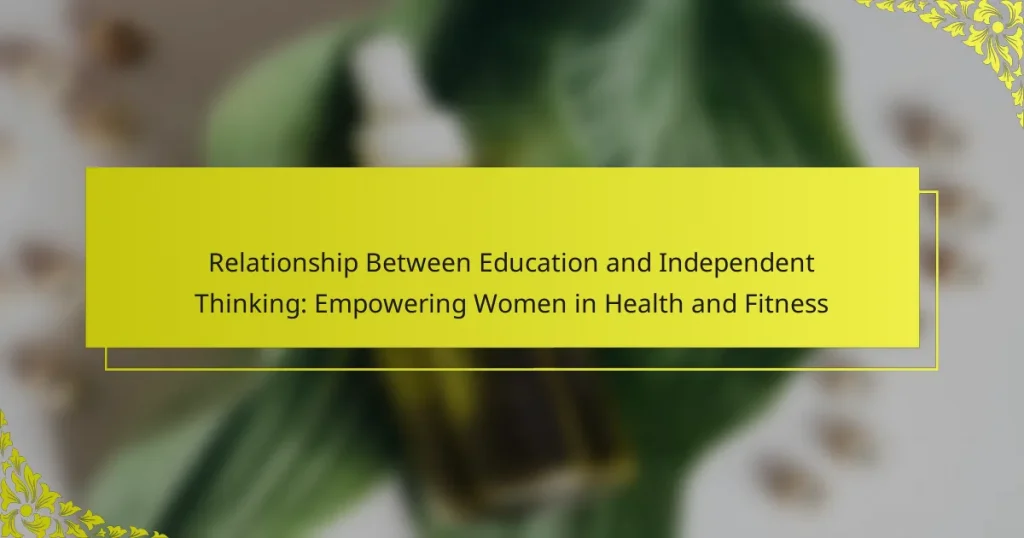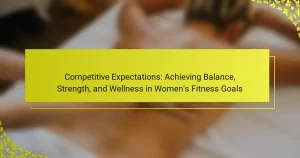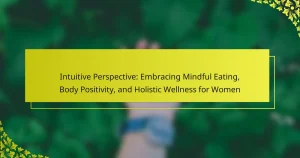Education enhances independent thinking in women’s health and fitness, enabling informed decisions and improved well-being. It promotes self-efficacy, encouraging women to engage in regular physical activity and make healthier dietary choices. Access to specialized health education and community support fosters a proactive approach to wellness. Ultimately, empowered women contribute to broader societal change through shared knowledge and resources.
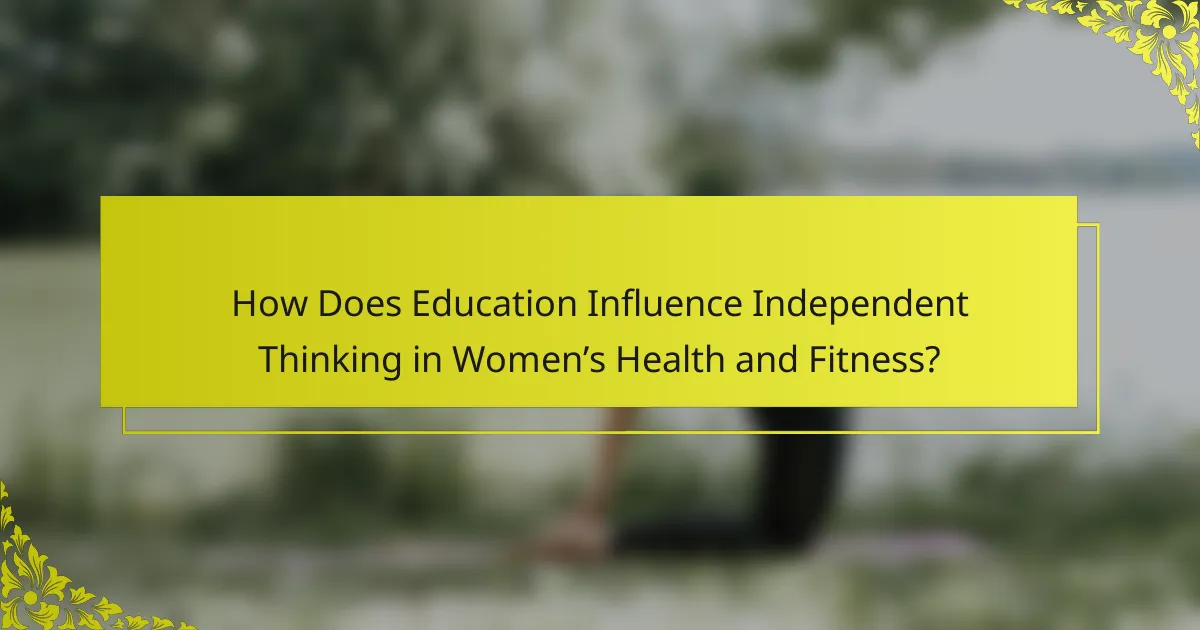
How Does Education Influence Independent Thinking in Women’s Health and Fitness?
Education significantly enhances independent thinking in women’s health and fitness by providing knowledge and critical skills. Educated women are more likely to make informed health decisions, understand fitness principles, and challenge societal norms. Studies indicate that higher education correlates with increased health literacy, enabling women to advocate for their wellness. This empowerment fosters a proactive approach to fitness, leading to better health outcomes and self-efficacy.
What Are the Key Educational Aspects that Foster Independent Thinking?
Education fosters independent thinking in women by promoting critical analysis, self-efficacy, and decision-making skills. Key aspects include curriculum design that encourages inquiry, opportunities for collaborative learning, and mentorship programs. These elements empower women to take charge of their health and fitness by enhancing their confidence and knowledge base. Programs focusing on health literacy and practical application of fitness principles further solidify independent thought, enabling informed choices in personal well-being.
Which Learning Methods are Most Effective for Women?
Interactive and experiential learning methods are most effective for women. These approaches foster independent thinking and empower women in health and fitness. For instance, group discussions enhance critical thinking and collaboration. Hands-on activities, such as workshops, promote practical skills and confidence. Additionally, mentorship programs provide personalized guidance, reinforcing self-efficacy. Research shows that women benefit significantly from environments that encourage active participation and peer support, ultimately leading to greater educational outcomes and personal growth.
How Can Workshops and Seminars Enhance Knowledge?
Workshops and seminars enhance knowledge by providing interactive learning experiences. They foster critical thinking and collaboration, empowering women in health and fitness. Engaging in discussions and activities helps participants apply concepts practically, reinforcing their understanding. Research indicates that experiential learning increases retention rates by up to 75%, making these formats effective for skill development and independent thinking.
What Role Does Critical Thinking Play in Health Decisions?
Critical thinking is essential for making informed health decisions, especially for women in health and fitness. It empowers individuals to analyze information critically, evaluate different perspectives, and make choices that align with their personal health goals. This independent thinking fosters confidence and enhances the ability to question conventional norms in health practices. Research indicates that education plays a significant role in developing these critical thinking skills, leading to better health outcomes. Engaging in continuous learning equips women with the tools to navigate health information effectively, ultimately promoting a healthier lifestyle.

What Are the Universal Benefits of Education in Health and Fitness?
Education in health and fitness empowers women by fostering independent thinking and enhancing decision-making skills. It promotes self-efficacy, enabling women to take control of their health. Studies show that educated women are more likely to engage in regular physical activity and make informed dietary choices. This leads to improved overall well-being and resilience against health issues. Additionally, education creates a supportive community, encouraging women to share knowledge and motivate each other. Ultimately, education in health and fitness serves as a catalyst for personal growth and societal change.
How Does Knowledge Improve Health Outcomes for Women?
Education significantly enhances health outcomes for women by fostering independent thinking. Empowered women make informed health choices, leading to improved well-being. Studies show that higher education correlates with better health literacy and access to healthcare resources. For instance, educated women are more likely to engage in preventive health measures, resulting in lower rates of chronic diseases. This relationship underscores the importance of education in promoting women’s health and fitness.
What Impact Does Education Have on Fitness Levels?
Education significantly influences fitness levels by promoting independent thinking and informed health choices. Educated women are more likely to engage in regular physical activity and understand nutritional information. Studies show that higher education correlates with increased health literacy, leading to better fitness outcomes. Furthermore, educational programs focused on health empower women to adopt healthier lifestyles, ultimately enhancing their overall well-being.

What Unique Attributes Empower Women Through Education?
Education fosters independent thinking in women through critical analysis, self-confidence, and informed decision-making. These unique attributes enable women to navigate health and fitness choices effectively. For instance, research shows that educated women are more likely to prioritize their health and advocate for their well-being. Furthermore, education equips women with the skills to challenge societal norms, promoting healthier lifestyles. Empowered women contribute to community health by sharing knowledge and resources, creating a ripple effect of positive change.
How Can Personalized Education Plans Enhance Engagement?
Personalized education plans enhance engagement by tailoring learning experiences to individual needs. They foster autonomy, encouraging women to think independently in health and fitness. This approach increases motivation and satisfaction, leading to higher retention rates. Personalized strategies can include goal-setting, adaptive learning tools, and mentorship, all of which empower women to navigate their educational journeys effectively.
What Innovative Programs Promote Health Literacy Among Women?
Innovative programs that promote health literacy among women focus on education and independent thinking. These initiatives empower women by providing access to information, resources, and community support. Programs like the Women’s Health Initiative and local workshops emphasize practical knowledge in nutrition, exercise, and preventive care. As a result, participants gain confidence to make informed health decisions, leading to improved overall well-being. Community-based approaches enhance engagement, ensuring that women from diverse backgrounds can participate and benefit.
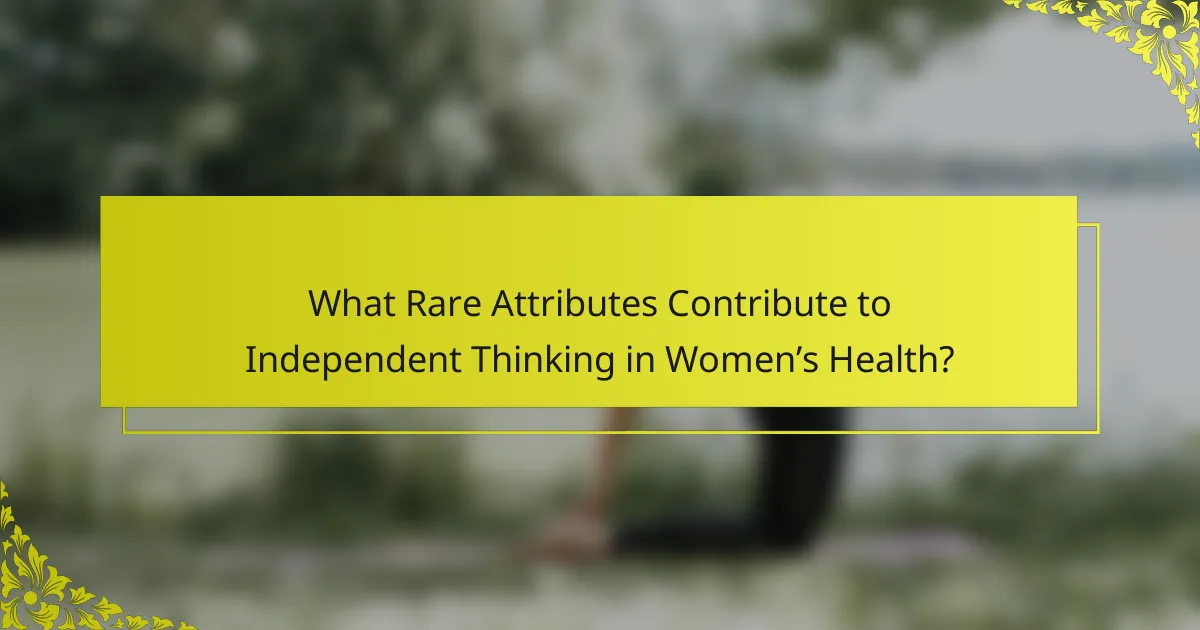
What Rare Attributes Contribute to Independent Thinking in Women’s Health?
Education fosters independent thinking in women’s health by enhancing critical analysis and self-efficacy. Rare attributes contributing to this relationship include access to specialized health education, mentorship programs, and community engagement initiatives. These elements empower women to make informed health decisions, thereby improving overall well-being and fitness outcomes.
How Do Cultural Perspectives Shape Women’s Health Education?
Cultural perspectives significantly influence women’s health education by shaping attitudes, beliefs, and practices. Education fosters independent thinking, empowering women to make informed health choices. For instance, culturally relevant curricula can address specific health issues faced by women in diverse communities. This approach enhances engagement and understanding, leading to better health outcomes. Additionally, integrating local cultural practices can promote acceptance and adherence to health education initiatives. Empowering women through education ultimately leads to improved health literacy and self-efficacy in managing their health.
What Are the Long-term Effects of Empowering Women Through Education?
Empowering women through education leads to significant long-term effects in health and fitness. Educated women are more likely to adopt healthy lifestyles, make informed health decisions, and prioritize fitness. This empowerment fosters independent thinking, enabling women to advocate for their health needs and those of their families.
Research shows that women with higher education levels tend to have better health outcomes, including lower rates of chronic diseases. As a result, they contribute positively to community health, promoting wellness initiatives and encouraging others to participate in fitness activities.
Moreover, education enhances women’s economic independence, allowing them to invest in health and fitness resources. This unique attribute of education creates a ripple effect, improving the overall well-being of families and communities. Ultimately, empowering women through education is a catalyst for transformative change in health and fitness.
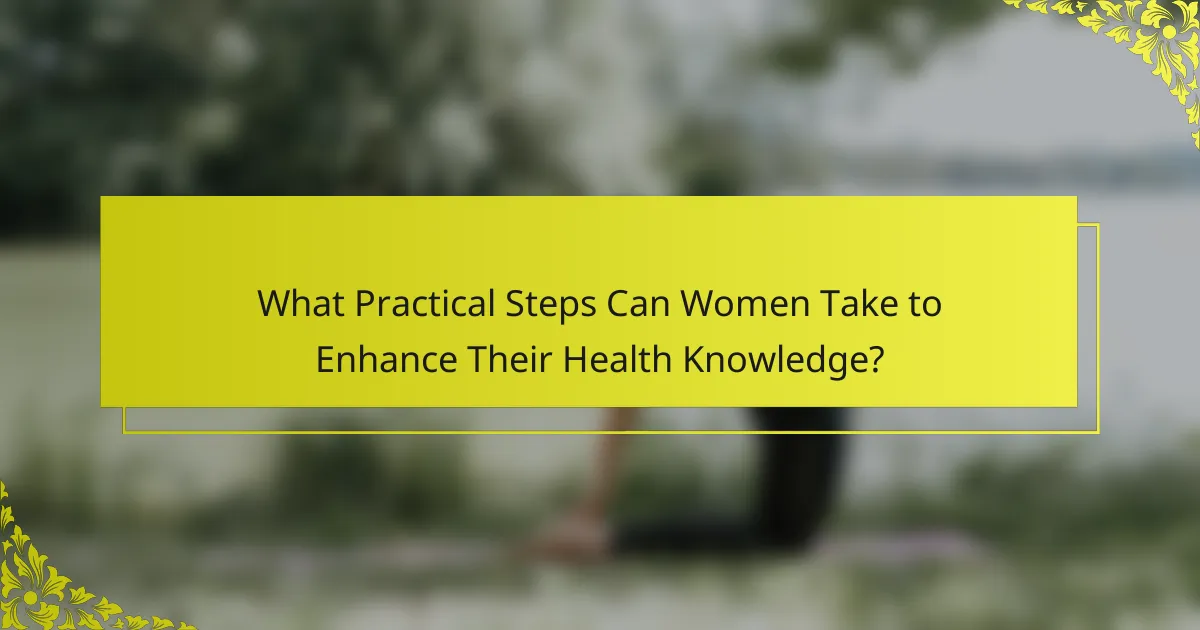
What Practical Steps Can Women Take to Enhance Their Health Knowledge?
Women can enhance their health knowledge through education and independent thinking. Engaging in workshops, reading health literature, and participating in online courses can significantly improve understanding.
1. Attend health workshops to learn from experts.
2. Read reputable health books and articles regularly.
3. Take online courses focused on nutrition and fitness.
4. Join discussion groups to share knowledge and experiences.
5. Follow credible health blogs and podcasts for ongoing education.
What Resources Are Available for Continuous Learning in Fitness?
Continuous learning in fitness is supported by various resources. Online courses, workshops, and certifications enhance knowledge and skills. Community support groups provide motivation and accountability. Educational podcasts and blogs offer insights from experts. Fitness apps deliver personalized training plans and progress tracking. Utilizing these resources empowers women to think independently and make informed health decisions.
How Can Women Build a Supportive Community for Health Education?
Women can build a supportive community for health education by fostering collaboration and sharing knowledge. Establishing local groups or online platforms encourages discussion and resource sharing. Engaging in workshops and fitness activities promotes empowerment and independent thinking. Research shows that women who participate in community health initiatives report increased confidence and better health outcomes. This collaborative approach enhances access to information, leading to informed choices in health and fitness.
What Common Mistakes Should Women Avoid in Their Health Education Journey?
Women should avoid common mistakes such as neglecting critical thinking, relying solely on popular trends, and ignoring personalized health needs. These errors can hinder their health education journey and limit empowerment in health and fitness.
One significant mistake is failing to question the credibility of sources. Women should evaluate information critically, focusing on peer-reviewed studies and expert opinions. This root attribute of independent thinking is vital for informed decision-making.
Another mistake is following one-size-fits-all advice. Health and fitness are individual journeys, and what works for one person may not work for another. Women should prioritize personalized approaches that consider their unique attributes, such as body type, fitness level, and health conditions.
Lastly, overlooking the importance of community support can be detrimental. Engaging with a supportive network fosters motivation and accountability. Women should seek out communities that encourage sharing experiences and knowledge, enhancing their health education journey.
What Expert Tips Can Help Women Cultivate Independent Thinking?
Education empowers women to cultivate independent thinking by fostering critical analysis and self-confidence. Engaging in diverse learning experiences enhances their ability to evaluate information and make informed decisions. Research indicates that women with higher education levels are more likely to challenge societal norms and advocate for their health and fitness. Additionally, mentorship programs can provide support and guidance, reinforcing independent thought processes. Encouraging participation in discussions and debates can further sharpen analytical skills, leading to greater autonomy in personal and professional choices.
